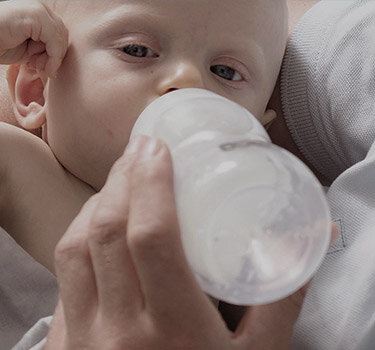A mother’s milk is very important for all newborns, but it is particularly valuable for those that are born prematurely.
Scientific consultation: Dr Agata Serwatowska - Bargieł, International Board Certified Lactation Consultant (IBCLC), neonatologist
Breastfeeding a premature baby, at least initially, is much more complicated than feeding a full-term, healthy baby. In the beginning, due to their - sometimes extreme - immaturity, these children are separated from their mothers, and the smallest ones often require intensive therapy. In addition, they cannot suck on their own. All this, however, does not eliminate the possibility of natural feeding. Moreover, breast milk is highly indicated as an important element of therapy in premature babies.
According to the WHO definition, a premature baby is a child born before the completion of 37 weeks of pregnancy. In Poland 7-16% of all births are premature. Breastfeeding of such little newborns poses a great challenge, both for the mother and the entire hospital personnel. However, the value of the mother’s milk justifies the effort.
Breast milk is the best source of nutrition for a premature baby. They are more sensitive and susceptible to infections than full-term babies, and the mother’s milk - apart from its nutritional value - provides them with the first and most fundamental immune protection. Children fed with breast milk get sick less often, and their mortality rates are lower. Breast milk adapts to the specific situation the mother and baby are in, and also functions as a medicine. For the first few weeks after the birth, the milk is more calorific, and contains more lipids, proteins, sodium, chlorides, potassium, iron and magnesium. This supports the child’s development, and addresses the problems associated with a premature birth.
Mothers of premature babies often worry whether they will have enough milk to feed their children. The organism starts to produce milk by approximately week 16 of pregnancy, so mums of preterm babies still have milk. Lactation starts when the placenta is delivered, and the proper level of milk production depends on breast stimulation. This is usually provided by the baby, but in special circumstances lactation can be effectively stimulated using a breast pump. Insufficient secretion of oxytocin in the mother’s organism, a hormone of happiness and affection, also known as the “cuddle hormone”, may pose a problem. Moreover, a high level of stress experienced by the mother of a premature baby often delays lactation.
Colostrum, the first milk produced by the mother, is a very powerful substance. It is rich in antibodies and growth factors. Therefore, even the youngest babies should receive at least a few drops of colostrum orally. It will help to activate the gastrointestinal system, and stimulate its maturation. Usually the youngest babies cannot suckle on the breast, but that does not mean they cannot receive mother’s milk. Initially, the milk is administered via a probe, directly to the stomach. As they grow, they can also be fed with expressed milk from a bottle, or breastfed.
The breasts should be stimulated as soon as possible after the birth. First, they can be stimulated manually, to obtain at least a few drops of colostrum. The mother can ask hospital personnel for help, as midwives are trained in expressing colostrum, and may provide useful instructions. Later, purchasing an electric breast pump is advisable (it is helpful in regular, frequent milk expression). Milk should be expressed every 3 hours, using the 7-5-3 method.
Kangaroo care, also known as “skin-to-skin contact”, means holding the naked baby close to the mother’s or father’s skin. Even very immature preterm babies can undergo kangaroo care, if their status is stable. The physician decides how long and how often the newborn should be held skin-to-skin. This contact is very valuable for the baby. Sensing the warmth of the mother’s body, the child calms down and develops faster, while for the mother this physical contact provides additional stimulus for milk production.
For a long time the child’s inability to eat can prevent oral nutrition. Premature babies usually cannot coordinate their sucking and swallowing with breathing; this ability forms around weeks 33-34 of gestation. The physician assesses if the baby is ready to eat on its own. After some time, the newborn can be put to the breast and learn how to suck.
After a few weeks, when the milk of a premature baby’s mother no longer differs from that produced by the mother of a full-term baby, it may not be sufficient in terms of calories, protein, calcium and phosphorus content. Therefore, most prematurely born babies receive supplementation with a breast milk fortifier to cover the deficits. If the weight gain is poor, the child may be fed with so-called “second phase” milk, which occurs after a few minutes (3-5) of expression, and is more calorific and nutritious.
Take every opportunity to be close to your baby. The skin-to-skin contact will help you both on your milky way.
A premature birth should in no way be the reason to give up breastfeeding. The mother’s milk is the best food for a preterm baby, and every effort should be made to use it as the basis of their diet.
Winter has come with its beautiful snowy landscapes, but, unfortunately, also with awful weather and wet feet. Disease does not discriminate and everybody can go down with cold. How to deal with it when you are pregnant?
There are some things you do not talk loud and often about, however, they are worth knowing when you are pregnant. Here you can read why a pregnancy favors intimate infections, whether they can pose a risk to your baby, and ...
Are you getting ready for childbirth? Are you planning a natural birth, but you know from other women's experience that is not always possible? Or maybe you already have had a date for a C-section scheduled due to obstetric ...
In the evening, you cannot fall asleep, therefore you are not able to regain your energy and strength. Your growing tummy starts to bother you, it is stuffy, uncomfortable, you are tired of your heartburn, you get cramps. ...

